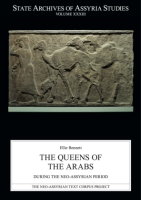Authority and Ideology in the Early Neo-Assyrian Empire (934–745 B.C.)
Zozan Tarhan
This monograph explores royal authority and ideology in the early Neo-Assyrian Empire (934–745 B.C.). It comprises four parts: (I) an overview of the sources, (II) a historical introduction to Assyria prior to the Neo-Assyrian period, and the two main sections devoted to analyzing (III) authority and (IV) ideology. Part III focuses on the reigns of the ten Assyrian kings of this period and studies their military, political, and building activities. This section discussed issues of authority in the context of military and political events, including Assyrian expansion, military campaigns, and building projects, as well as clarifying uncertain dating and chronology of events. Part IV studies the ideological framework of the actions of the Assyrian kings—that is, the justifications and motivations for their deeds—by analyzing the ideological motifs, beliefs, and messages of textual and visual narratives. Tarhan investigates Assyrian royal ideology from multiple angles, considering its religious nature, the imperial mission, and the portrayal and different roles of the Assyrian king.
- Description
- Bio
- Subjects
The methodology combines philological work with cuneiform texts, analyses of iconographic sources, and archaeological data. The book aims to provide a comprehensive historical and cultural analysis of the reigns of the Assyrian rulers and the ideology of kingship. It tackles a desideratum of Assyriology and contributes to ancient Near Eastern studies and ancient history in general by tracing the constants and variations in Assyrian royal ideology.
Zozan Tarhan is an Assyriologist whose research interests are primarily focused on the Neo-Assyrian Empire, Assyrian royal ideology, and Mesopotamian scholarship. She has published one monograph and several articles dealing with these topics.
Also of Interest
Mailing List
Subscribe to our mailing list and be notified about new titles, journals and catalogs.
.jpg)



md_294.jpg)



